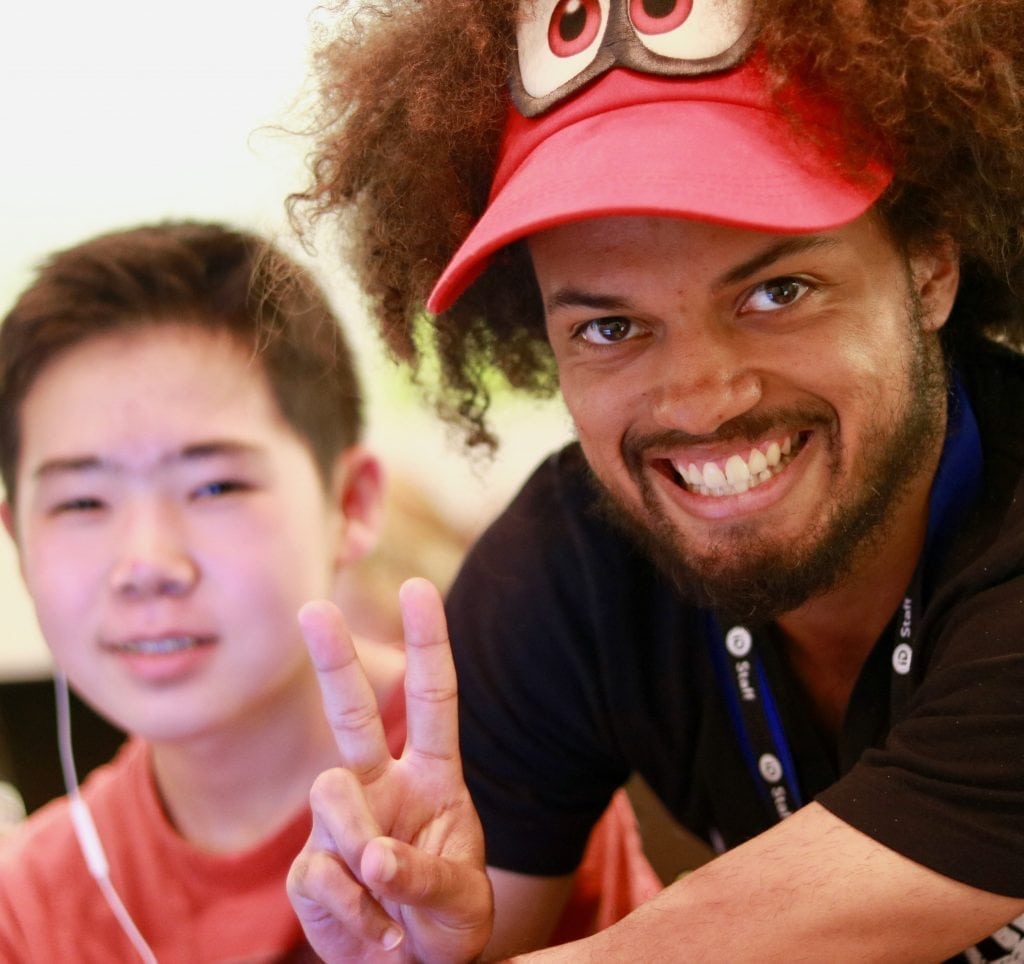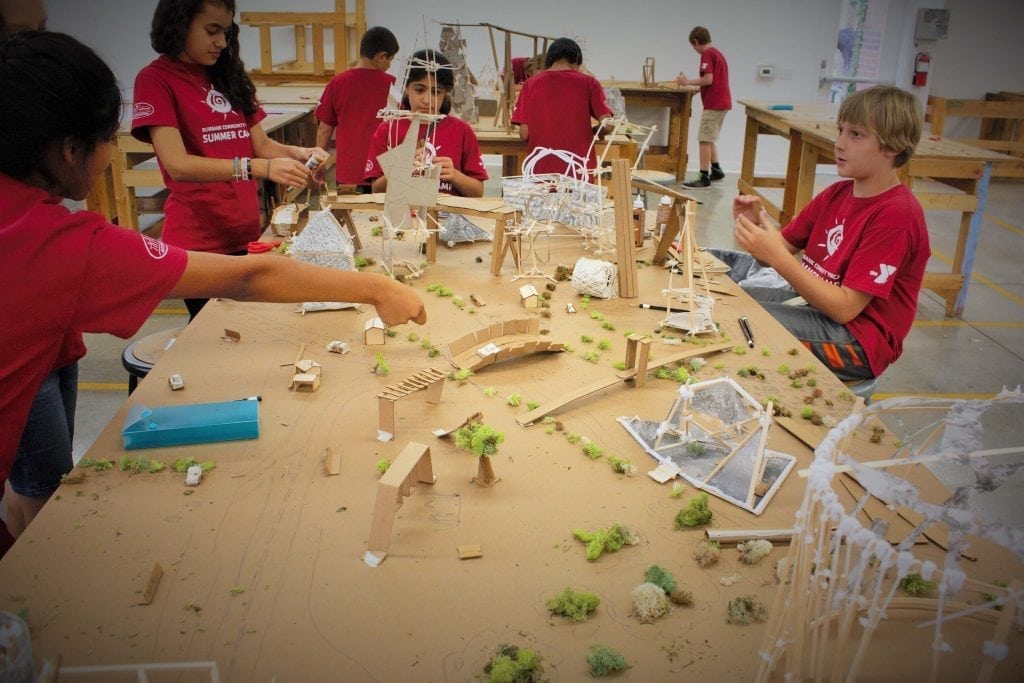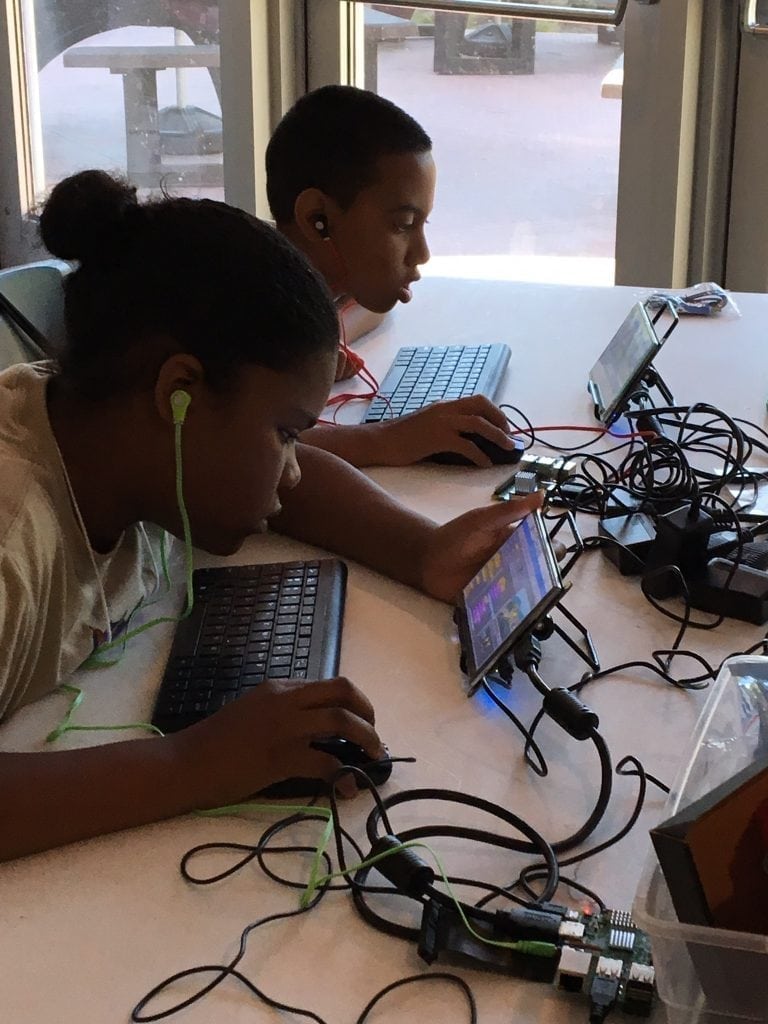
iD Tech camps offer online tools to help parents get campers to camp on time – so they don’t miss out on any of the fun. PHOTO COURTESY ID TECH CAMP
May is here and your kids are no doubt counting down the last days of school for summer camp in Los Angeles to commence. Let them have their fun.
You, dear parent, need to be counting down your final days to prepare for summer camp. Whether this is your first go-round or you are a summer-camp veteran, pay attention, because what you do over the next few weeks could make the difference between smooth sailing and a summer that runs aground on one obstacle after another.
If you haven’t yet composed a list of camps that fit your schedule, budget and child’s interests – and that you’ve determined are safe and well run – hurry and do that now. Next, sit down with the kids, narrow that list to the one or more camps they will attend this summer and hop online to find out when the registration deadlines are.
Signing Up
Before you actually fill out the online form, you’ll want to gather some information. OK, a lot of information.
“I know some parents are a little daunted or overwhelmed by that, but it’s all to ensure the safety of their kid,” says Kelly Nittoli, director of community programs at Woodbury University, which offers four summer youth camps on its Burbank campus. “We need to have everything on file in that just-in-case scenario.”
“Everything” can include health history, doctor and dentist names and phone numbers, insurance information, date of last tetanus shot and other immunizations, information about allergies and other health issues and T-shirt size (for that all-important camp shirt). Some camps – especially sports and sleep-away camps – require a pre-camp physical, for which you’ll need to plan ahead. You might also need a doctor’s note if your child requires medication.
You will be asked to provide two extremely important lists of names and phone numbers. The first is a list of emergency contacts. These are the people the camp will call if something happens to your child. Include yourself on that list – with all of your different contact numbers. “That’s the biggest complaint we have,” says Kassandra Wilsey, director of Cali Camp in Topanga. “People will put the same phone number in all the different blocks for phone numbers. You really want to give both parents’ cell phones, a home phone, a grandparent’s phone and someone else who is within driving distance of the camp.”

Architecture is one of many subjects campers can explore during Youth Camps at Woodbury University. Leave a little extra time at drop-off and pick-up so your child can show you their creations. PHOTO COURTESY WOODBURY UNIVERSITY
Think of who you would call first if you couldn’t pick up your child, and include all of those folks. Don’t include grandparents who live in another state or people who will be away half the summer on vacation. Wilsey has phoned the grandparent of a camper with a fever only to be told, “Oh, we live in Michigan.” Not much help.
The second list – and there may be some overlap – is the list of people authorized to pick up your child on a daily basis. “I would really encourage parents, when they’re signing up, to think of any possibility, of any alternative,” says Greg Cohen, education manager at Discovery Cube. “We have had people sign up 12 people who are alternatives.” In a pinch, you could call the camp and let them know Aunt Cathy will be picking up today, but it’s so much easier if she is already listed.
To lock in your child’s spot you’ll likely need to pay tuition – or at least a deposit – up front, so be ready with those credit card numbers.
Meds, Gear and Clothing FAQ
Don’t close that browser window just yet, though. Your camp’s website is the place to gather information about the things you’ll need to gather up before your child’s first day. Take a look and find out what your child should bring to camp.
If your child needs medication given during the camp day, or has to have an asthma inhaler or EpiPen on hand, you’ll likely need to provide it in its original packaging clearly labeled with the child’s name. Some camps will ask you to provide a supply that can stay at camp all week, but each camp handles this differently.
Camps also differ in what they want kids to wear. Woodbury requires all campers to wear a camp T-shirt every day (and they’ll sell you more than one so that you don’t have to do laundry every night), while Discovery Cube encourages daily wear but doesn’t require it, and iD Tech Camp has kids wear them only on Fridays at their summer camp in Los Angeles.
One thing most camps do have in common is that they encourage clothes that let kids be active and shoes that protect their feet. “We do cooking classes and we do woodworking classes where they’re using saws and knives,” says Elizabeth Paravicini, site director at Summer Art Academy, which, like most camps, requires closed-toed shoes.
Remember that even during our blazing summers it can be cool in the mornings, so send your child in layers. Pack a swimsuit and towel if there will be swimming or water play, long pants if needed and whatever else the camp requires. But before you do, label everything with your child’s first and last name. “I have so many sweaters that are here labeled ‘Logan.’ I have 10 Logans. I don’t know which this belongs to,” says Wilsey, who admits to giving “bags and bags” of lost, unlabeled clothing to Goodwill each year.

Lots of crazy fun takes place at Summer Art Academy, and doing your homework now will make for smooth sailing for your camper this summer. PHOTO COURTESY SUMMER ART ACADEMY
As far as special equipment, check with the camp before you run out and buy something. All the gear kids need for the equestrian program at Cali Camp, for instance, is provided. “I hate when I see a parent go out and spend a lot of money on this whole wardrobe that they think their child needs when we provide that for them,” Wilsey says.
Lunch and Snacks
Your kids will need plenty of food to fuel their summer-camp fun, and most camp websites have the lowdown on what is provided, what isn’t, and other policies (e.g. whether the camp is nut-free or bans sugary snacks and sodas, and whether lunch rules change on field trip days).
At iD Tech camps, which take place on several local university campuses, campers eat in the university dining hall and can purchase food from there or bring it from home. Campers also have access to campus vending machines. “Kids are just thrilled they get to spend some of their parents’ pocket change that they’re given for the day and pick up a bag of chips and a soda,” says Charlie Freund, territory manager for the camps.
Find out whether your child’s camp has snack times in addition to lunch, and pack or send money accordingly. “We have two different breaks and we have an hour lunch break,” says Paravicini. “What tends to happen is that parents will only make enough food for them to eat during one snack.” That leaves some campers without a lunch.
“The food that they need on a school day, when they’re just sitting in the classroom learning, maybe going out for a 20-minute recess, is much different than the amount of calories that they’re burning at camp,” says Wilsey. “The kids are usually hungry, very hungry.” A mom of three, Wilsey sends her kids to camp with extra non-perishable snack items. That way, anything they don’t eat can be saved for the next day.
Building Excitement
As you’re gathering details about camp, don’t lose sight of the reason you’re doing it: So your child can have a great time this summer. Don’t let your child lose sight of it, either.
“A lot of kids show up on the first day and they’re not quite sure what Mom or Dad signed them up for,” says Nittoli. To prevent this, attend the camp orientation if it has one, read the parent handbook and visit the website together.
Getting oriented can be especially important if you have a child with separation anxiety. “Before they have that first day of camp, it really helps kids that have separation anxiety issues to actually see the place where they’re going to go,” says Laura Porter, owner of Bloom School of Music and Dance in Eagle Rock, which offers summer camps for ages 4-5 and 6-10. Mom of two children – one who had separation issues and one who didn’t – Porter suggests taking a class at the venue before camp starts if that is an option, or at least making a pre-camp visit.
You can also dig into the camp’s themes. Discovery Cube, for instance, is offering a dinosaur camp, a mission to Mars space camp and a coding camp. “Look at that subject matter, then just start doing some online browsing,” says Cohen. “Kids should just have some fun seeing what they can learn on their own and, more importantly, what kind of questions they can bring to camp. Encourage the curiosity factor.”

One of the three camps being offered at Discovery Cube L.A.’s Camp Discovery this summer is “Code Constructors: An Exploration of the Raspberry Pi for grades 6-8.” PHOTO COURTESY DISCOVERY CUBE
There and Back Again
A pre-camp visit can be an important part of achieving an important mission: getting your kids to camp on time. Why?
“The first 15-30 minutes of camp is filled with ice breakers. It’s filled with socialization situations that help the kids bond,” explains Cohen. Kids who come late miss that opportunity and also miss the chance to hear about what is happening that day at camp. “All of our camps are jam-packed with activities, and they’re all sort of laid out in the first half hour of camp,” Cohen says. “It’s tough to be the only kid in the room that’s not sure what’s coming up next.”
This is especially true of that very first day of camp. “Monday can be a bit awkward, can be a bit slow to get people warmed up,” says Freund, “but there are things happening at camp like welcome speeches and icebreakers and maybe just goofiness, setting the tone for making friends and feeling comfortable in the space.”
To ensure that you’ll be a camp early bird, sit down with your family before that first day to talk logistics. Be clear about who is responsible for dropping off, and that you know where you’re supposed to go and what the drop-off procedures are.
To help parents navigate the campuses where its camps are hosted, iD Tech provides online tools, including a map pin that works with Google maps. Whatever navigational tools you’re using, take a look before the first day of camp and make sure you understand the directions. “Use your phone to have the directions start at home and kind of flip through the upcoming steps and see that it leads you to a point that makes sense,” says Freund.
Also, find out where you can park (yes, you’ll need to park and sign your kids in and out). “You have to park. You have to walk into the room. We do require to see you in person,” says Nittoli, adding that it’s a good idea to allow a little extra time. “You never know when we might need to share a couple of things with you about your child or update you on certain camp happenings.”
To help find that extra time in the morning, get your child packed up and ready to go – with your child’s help – the night before. “Pack the bag with your camper so that your camper knows what’s in there for them,” says Wilsey. She’s seen campers miss out on swimming, go hungry at snack or have to drink from paper cups because they didn’t know their parents had packed a swimsuit, extra snack or water bottle in their bags.
Picking your kids up from camp on time is also important (some camps charge extra for late pick-up) and you’ll want to allow extra time for this as well. “I would hope parents are considerate to each other,” says Freund. “I know many people are in a rush at the end of the day, and there’s often a line that can start to queue. So just be considerate of other parents who have gotten there ahead of you and are also waiting.”
In other words, remember your manners. You and anyone else who might arrive to pick up your child should also remember to bring your photo ID. “That goes for the last day of camp, when we know you, as well as the first day of camp,” says Cohen.
Yes, it’s summer camp and it’s supposed to be laid back and fun. But to make things fun for your child, you have to do the work up front. “Nine times out of 10, if the student isn’t having a great experience, it’s because there hasn’t been some sort of communication between us and the parent allowing for a smooth process,” says Nittoli. “If there’s just a little bit of due diligence on parents’ part in the beginning, it makes for a pretty smooth, exciting summer for everybody.”
Christina Elston is editor of L.A. Parent.
Editor’s note: This is the fourth in a series of articles about summer camp. Last month, featured counselor-in-training programs for teens and tweens. Next month we’ll talk about summer camp field trips. Find all our camp coverage through the #CampReady link at LAParent.com.



























